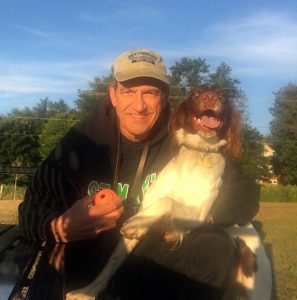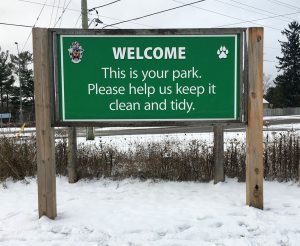
I generally arrive there about sunrise and make a second trip there about sundown. As usual, I have to restrain my four-legged pal each time I get there; my English springer spaniel knows we’re going to the off-leash park. With varying levels of success, I try to keep my dog Jazz leashed and at the heel until we get inside the entry area. Then, when he’s relatively still, I open the main gate and give him his release command.
“Go free,” I tell him. And away he runs and runs. Almost without exception, it’s only a matter of moments before he defecates. And even in the gloom of the dawn or the dusk, I make sure that I follow him closely, so that when he crouches I’m there to stoop and scoop.
A couple of weeks ago, I arrived at our Uxbridge Off-Leash Dog Park on the 6th Concession next to the museum, gave Jazz his “go free” command and almost immediately picked up his first deposit, then another. By that time, we’d arrived at the far south end of the park for some play; I heaved his favourite rubber ball into the distance, and he pounded across the turf to retrieve it.
Not long after that, Jazz and I were joined in the park by several of his pals – Shelby, Blue, Morris, Lokey, Poppy, Fred – and of course by their owners. As the sky brightened that morning, we dog owners beheld a most disconcerting sight – an unusual number of piles of poop and discarded collection bags scattered across the park surface. I picked up half a dozen bags and another half-dozen neglected piles.
“Do people think this stuff will magically disappear?” I said out loud in disgust.
“Probably,” remarked Shelby’s and Blue’s owner, “since you’re picking it all up.”
Since I was 10 years old, I’ve almost always had the good fortune to have a canine companion in my life; nothing brought more pleasure than running through farm fields and forests with friends and dogs. When our own children filled our lives with activity and play, dogs doubled the pleasure.
When the pandemic hit in 2020, keeping us housebound and isolated, within a year my wife and I had joined thousands of baby boomers and their millennial children, queuing up to buy a puppy. The trend became known as the “pandemic puppy phenomenon.” We somehow knew we’d have the time and certainly the gap in our lives to fill with a dog.
Enter our high-energy, high-maintenance English springer spaniel. Not long after we acquired Jazz, I introduced him to our off-leash park. We both loved it.
And with the puppy-buying explosion, we’ve seen a dog-park explosion. The first official dog park appeared in Berkeley, California, in 1979. According the U.S. Recreation and Park Association, the number of dog parks and off-leash spaces in American cities doubled between 2005 and 2010, with cities in Nevada, Oregon and Wisconsin leading the way.
The City of Calgary features the most dog parks per capita in Canada, with 152 off-leash areas. In some parts of North America, off-leash parks have sparked unexpected development. Especially when cities and towns have handed over vacant spaces to dog-park organizers, their creation has sparked crowd sourcing, corporate investment and development of public space, river walks, public art and community gardens.
 “Off-leash dog parks have boomed because people benefit directly from them,” says Dave Alexander, who studies dog and human behaviour in the U.S. “Dogs lower social barriers for themselves and their owners. They get people talking and relating again.”
“Off-leash dog parks have boomed because people benefit directly from them,” says Dave Alexander, who studies dog and human behaviour in the U.S. “Dogs lower social barriers for themselves and their owners. They get people talking and relating again.”
Which may be why Uxbridge’s off-leash park is fraying around the edges. Sometimes when I bring Jazz to the park, I can hardly get by the gathering of people at the shelter just inside the gate. With good intention, the park has become an attractive people hub, with plenty of conversation, companionship, and camaraderie among dog owners.
However, with all that socializing among the owners, I fear we’ve let our guard down on the behaviour of our dogs and consequently the maintenance of our park.
In recent months, I think a lot of us dog owners have neglected what I call the three S’s of dog-park etiquette – socializing, supervising and scooping. With the community confab at the gate, we’re not paying attention to restraining aggressive tendencies in our dogs; we’re not fine-tuning our dogs’ response to basic obedience commands; and as I discovered the other day, we’re not keeping an eye on where our dogs dump.
Like so many community initiatives, at our off-leash park it’s responsible behaviour of human citizens that ensures healthy behaviour of canine citizens.
Dear Ted,
I look forward to greeting you at the PROBUS Club of Durham West General Meeting on November 10th, 2022, at the Ajax Community Centre. I really enjoyed the story about the dog park and the variety of interests that you have. I recently walked past our local high school, and we’re not watching where our kids/passers by dump, either.
Interesting website!